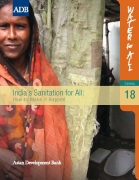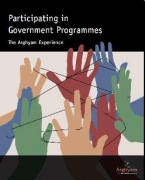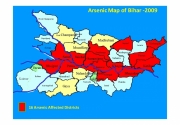Governance
The power of uncertainty: Reflections on the nature of transformational initiatives - Malcolm Adiseshiah Centenary Lecture by Mihir Shah
Posted on 26 May, 2010 11:21 PMIn this lecture, the author makes connections between the concepts of certainty and uncertainty and draws parallels between these and the scientific or the positivist approach and the phenomenalist approach. The author argues that the excessive emphasis on certainty, which is an inherent assumption of the scientific approach embraces reductionism, compartmentalisation and has been the principle underlying all disciplines such as developmental economics.
India's Sanitation for All: How to make it happen - An ADB report
Posted on 26 May, 2010 11:02 AM This discussion paper by ADB, examines the current state of sanitation in India in the context of the Millennium Developmental Goals, which call for a 50% reduction in the proportion of people without sanitation by 2015 and India's goal of providing Sanitation for All by the 2012.
This discussion paper by ADB, examines the current state of sanitation in India in the context of the Millennium Developmental Goals, which call for a 50% reduction in the proportion of people without sanitation by 2015 and India's goal of providing Sanitation for All by the 2012.
The paper targets policy makers, governmental ministries, state and local governments, non-governmental organisations, developmental agencies and all those who are involved in the planning and implementation of sanitation policies in India. It makes a few recommendations for the successful implementation of sanitation efforts in India.The focus of these recommendations is on household sanitation, which includes safe disposal of human excreta, as measured by household ownership of a sanitary latrine and household access to drainage facilities.
Negotiate: Reaching agreements over water - Paper by IUCN
Posted on 25 May, 2010 06:49 PM This book by IUCN is directed at practitioners involved in water-related negotiations that aim at fair and mutual agreements on optimum and sensible use of water by all. The book provides the necessary motivation, ideas, tools and inspiration for people involved in water negotiations throughout the world.
This book by IUCN is directed at practitioners involved in water-related negotiations that aim at fair and mutual agreements on optimum and sensible use of water by all. The book provides the necessary motivation, ideas, tools and inspiration for people involved in water negotiations throughout the world.
Many a times, the underlying approach to negotiations involves bargaining and competition. However, the book believes that emphasis on constructive engagement involving multiple perspectives and consensus building can lead to fair and equal distribution of this valuable resource to everyone.
The book is divided into five chapters that give out important key messages as to how to go about the process of negotiating:
Rank of Indian cities on sanitation (2009-10) - National Rating and Award Scheme for Sanitation in Indian Cities (MoUD)
Posted on 24 May, 2010 02:18 PMIn order to get a sense of the current status of sanitation in India's cities, a survey was initiated by the Ministry of Urban Development as a part of the National Rating and Award Scheme for Sanitation for Indian Cities. The methods used for the survey can be found on the Ministry of Urban Development website.
The findings and the rankings of the cities according to the survey found that the situation was grim with only 25 cities topping the list, while majority of the others lagged behind in terms of a number of sanitation parameters.
Uttar Pradesh State Government invites public opinion on Groundwater Bill
Posted on 21 May, 2010 03:04 PMIn an attempt to tackle the deteriorating ground water situation in the state, the Uttar Pradesh State Government has drafted the Uttar Pradesh Groundwater Conservation, Protection and Development (Management, Control and Regulation) Bill (2010), and has invited feedback from the public.
Comments have to be sent before 5 July 2010 by email to up.gwd@rediffmail.com or by post to this address: Director, Utttar Pradesh Groundwater Department, Navam Tal, Indira Bhavan, Ashok Marg, Lucknow, Uttar Pradesh.
The draft copy of the Act is uploaded on the UP State Groundwater Department website and can be downloaded here, and is also attached with this post.
Participating in Government Programmes - The Arghyam Experience (2010)
Posted on 21 May, 2010 01:25 PM Arghyam, a civil society organisation working on water issues since 2005, has participated in drinking water programmes involving State Governments since its inception, either directly or by partnering with local Civil Society Organisations (CSOs).
Arghyam, a civil society organisation working on water issues since 2005, has participated in drinking water programmes involving State Governments since its inception, either directly or by partnering with local Civil Society Organisations (CSOs).
This publication documents Arghyam's and its partners' collective experiences in participating in these Government programmes and puts forward key learnings and challenges.
The various programmes include - Sachethana, a school rooftop rainwater harvesting programme, and Suvarnajala, a flouride mitigation programme, both in Karnataka; Pani Thiye Panjo, a decentralised drinking water management programme in Gujarat; and Mazhapolima, an open-well recharge programme in Kerala.
Brainstorming workshop on “Integrated Domestic Water Management in the arid and semi arid regions of India”, TARAgram, Orchha, MP
Posted on 17 May, 2010 09:33 AMVenue: TARAgram, Orchha Tigela, Orchha Dist. Tikamgarh – 472 246 (MP) (11 kms from Jhansi Railway station)
Description:
Development Alternatives (DA) is a research organization and it has a focus on innovation and policy outreach. DA is engaged in a research study sponsored by India Water Partnership (IWP) - “Knowledge Dialogue on Integrated Domestic Water Management-Preparation of Compendium and Status paper”. The overall objective of this study is to influence National Water Policy which governs the management of water resources in India with a view to incorporate aspects of Integrated Domestic Water Management (IDWM) in the semi arid and arid regions of India.
Increasing transparency and accountability – Another win!
Posted on 14 May, 2010 11:31 AMGuest Post: Amrtha Kasturi Rangan, Arghyam
“When a State Government instead of itself undertaking a work, if it allows an agency like the petitioner Company by substantially funding them to undertake such work which is essentially that of a municipality, no one can say that such work of the petitioner company as a private activity. On the other hand, it is very much a public activity over which public interest can generate”.
Judgement in WP NO. 9794 of 2008 and M.P. Nos. 1 and 2 of 2008
The Right to Information (RTI) Act, 2005 was enacted to ensure transparency and accountability. As per the Act any citizen can write and ask for information from a “public authority”. The Act also requires that public authorities make information about themselves available to the public – mandatory disclosure.
From its time of enactment, there have been several challenges in operationalizing the RTI Act. A progressive civil society has constantly challenged hesitation and delay in providing information. Several ambiguities have required judicial intervention to interpret the letter and the spirit of the Act. Here we look at the success of widening the scope of accountability to include private agencies who partner with the government under the Public Private Partnership (PPP) model.
Arsenic contamination of groundwater in Bihar and mitigation strategies - A research study
Posted on 12 May, 2010 11:24 PM This presentation deals with the problem of arsenic contaminated aquifers in the Gangetic belt of Bihar and the failure of the state government in tackling the crisis and calls for the establishment of a centralized knowledge & research hub with an understanding of the regional peculiarities to mitigate the crisis.
This presentation deals with the problem of arsenic contaminated aquifers in the Gangetic belt of Bihar and the failure of the state government in tackling the crisis and calls for the establishment of a centralized knowledge & research hub with an understanding of the regional peculiarities to mitigate the crisis.
It traces the origin of arsenic crisis to the switch from use of surface water to groundwater. The health impacts of arsenic poisoning and the factors that aggravate arsenicosis are explained. A total of sixteen districts (fifty-seven blocks) in Bihar are affected by high levels of arsenic in groundwater, in trivalent form, which is a more toxic form of arsenic.
Formulating action plan for removal of arsenic contamination in West Bengal - Planning Commission Task Force report
Posted on 12 May, 2010 11:49 AMThe report of the Task Force appointed by the Planning Commission presents an action plan for removal of arsenic contamination in West Bengal. It looks at the extent of the problem, its intake sources, technologies available and the operation and maintenance (O&M) issues.
It outlines the diverse technologies based on various scientific principles, assesses them based on their scale of operation (domestic or community) on techno-economic considerations & infrastructure required and provides suggestions. Short, medium and long term measures are outlined for tackling the problem of arsenic contamination in drinking water supply in the state.





